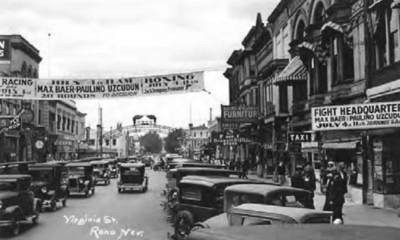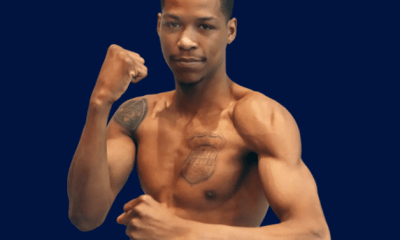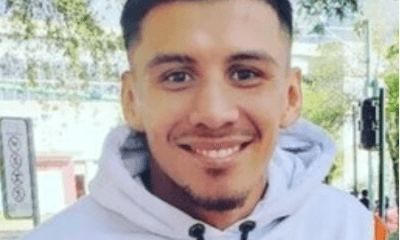Featured Articles
Weekend Boxing Recap
WEEKEND BOXING RECAP — There were no mega-fights on the first weekend of February, but there were a number of noteworthy fights scattered around the globe.
The weekend began on Friday (Thursday in the United States) at the Adelaide Oval in North Adelaide, Australia, where 43-year-old Danny Green and 41-year-old Anthony Mundine renewed hostilities after an interlude of 10 years and 261 days. Green turned the tables on Mundine, avenging his 2006 defeat by majority decision in a match that wasn’t pretty but yet entertaining with the outcome seemingly in doubt until the very end.
Mundine accepted the decision graciously until he had time to think about it. “I whipped his arse,” he said the next day while threatening to lodge an appeal to have the decision overturned. He had many sympathizers. Daily Telegraph correspondent Nick Compton, who scored the bout 95-93 for Mundine, called the decision outrageous. His ire was directed at veteran Honolulu arbiter Hubert Minn who had it 98-90 for Green, a score that in Compton’s words defied belief. But as for a rubber match, Compton hopes not. Green and Mundine “looked old and fought old because they are old,” he said.
The bout between the former world champions was front page news in Australia. On the undercard, the Moloney twins, Andrew, a bantamweight, and Jason, a super bantamweight, continued their winning ways at the expense of Filipino opponents. Andrew Moloney scored an 8-round unanimous decision over Renoel Pael. Jason Maloney won his 8-round bout by UD over Marco Demecillo. The identical twins sport identical 12-0 marks.
In another bout of note, Tim Tsyzu, a 22-year-old middleweight, improved to 2-0 with a third round stoppage of trial horse Mark Dalby. Tzyzu is the son of Kostya Tsyzu. The elder Tsyzu was inducted into the International Boxing Hall of Fame in 2011.
– – –
In San Juan, Puerto Rico, hometown favorite Felix Verdejo returned to the ring after an absence of nearly eight months and improved to 23-0 with a 10-round unanimous decision over Nicaraguan southpaw Oliver Flores. Verdejo’s timetable was set back when he crashed his motorcycle in August of last year, incurring injuries that forced him to spend four days in the hospital. At the time of the incident his promoter, Bob Arum, was in negotiations to match him with WBO lightweight champion Terry Flanagan.
Verdejo won comfortably on the scorecards – 99-91, 98-92, and 96-94 – but wasn’t sharp. It took him several rounds to find his range. He is penciled in to headline a June 10 card against an undetermined opponent at the Theater of Madison Square Garden, a date that coincides with New York’s annual Puerto Rican Day parade. Down the road, it’s easy to envision him renewing acquaintances with Vasyl Lomachenko who defeated him in the quarterfinals of the 2012 Olympics.
SATURDAY
At the Olympia in London, Chris Eubank Jr. (pictured with his father) advanced to 24-1 with a 10th round stoppage of overmatched Renold Quinlan. The bout was contested for a minor 168-pound belt.
Quinlan (11-2), an Australian of Fijian descent, scored one of the bigger upsets of 2016 when he demolished Daniel Geale in two rounds, but he was out of his league against Eubank. After the bout, Eubank, who says he is equally comfortable fighting as a middleweight or super middleweight, called out James DeGale, Gennady Golovkin, and Billy Joe Saunders. Eubank would likely be favored over Saunders who saddled him with his only defeat. In that match, Eubank was slow to get into a rhythm and suffered a narrow loss on points.
In the co-feature, Christian Hammer, a Germany-based Romanian, successfully defended his version of the European heavyweight title, coming off the deck to forge a seventh round stoppage of David Price. Standing 6’8” and weighing 275 pounds, Price embodies the saying “the bigger they are, the harder they fall.” His record now stands at 21-4, but all four of his defeats were of the knockout variety. He has stamina issues and a soft beard, a toxic combination.
In another bout of note, Welsh flyweight Andrew Selby moved to 8-0 with a 10-round unanimous decision over Filipino veteran Ardin Diale. Selby won every round on all three scorecards.
Based on his amateur pedigree, Selby has a bigger upside than his older brother Lee Selby, the reigning IBF world featherweight champion. His showing against Diale earned high marks from ringsider Andre Ward who was part of the ITV broadcasting team.
– – –
In Magdeburg, Germany, Agit Kabayel captured the vacant European heavyweight title with a 12-round unanimous decision over Belgium’s Herve Hubeaux. A 24-year-old German with a kickboxing background, the undefeated (16-0) Kabayel was initially scheduled to face Mariusz Wach but Wach pulled out with an undisclosed injury. Hubeaux (26-2) had won 14 straight coming in.
– – –
In Gauteng, South Africa, mighty-mite Hekkie Budler improved to 31-2 at the expense of Joey Canoy of the Philippines who retired on his stool after seven frames. (Saturday was not a good day for Filipino boxers.)
Budler, a former WBA world minimumweight champion, is the most popular little man in South Africa since the late Jacob “Baby Jake” Matlala.
– – –
In Cuautitlan, Izcalli, Mexico, a suburb of Mexico City, Tijuana’s Jaime Munguia, a welterweight, improved to 20-0 with an impressive second round knockout of countryman Juan Macias Montiel. A crushing right hand finished Montiel who was 19-3-1 going in. For the lanky Munguia, who bears watching, it was his 11th straight win inside the distance.
Munguia-Montiel shared top billing with a 10-round contest in the super bantamweight division between Tijuana’s Jackie Nava and Venezuela’s Ana Maria Lozano. The 36-year-old Nava, who was returning to the ring after a two-year absence, won a unanimous decision, improving to 33-4-3. The fights were televised on BeIn Espanol.
Jacqueline “Jackie” Nava is one of the more interesting personalities in boxing. A college graduate and the mother of a young daughter, she was elected in 2015 to the Chamber of Deputies, the lower house of the Mexican Congress.
Check out more boxing news on video at The Boxing Channel.
-

 Featured Articles3 weeks ago
Featured Articles3 weeks agoAvila Perspective, Chap. 330: Matchroom in New York plus the Latest on Canelo-Crawford
-

 Featured Articles2 weeks ago
Featured Articles2 weeks agoVito Mielnicki Jr Whitewashes Kamil Gardzielik Before the Home Folks in Newark
-

 Featured Articles4 weeks ago
Featured Articles4 weeks agoOpetaia and Nakatani Crush Overmatched Foes, Capping Off a Wild Boxing Weekend
-

 Featured Articles3 weeks ago
Featured Articles3 weeks agoCatching Up with Clay Moyle Who Talks About His Massive Collection of Boxing Books
-

 Featured Articles4 weeks ago
Featured Articles4 weeks agoFabio Wardley Comes from Behind to KO Justis Huni
-

 Featured Articles2 weeks ago
Featured Articles2 weeks agoMore Medals for Hawaii’s Patricio Family at the USA Boxing Summer Festival
-

 Featured Articles3 weeks ago
Featured Articles3 weeks agoThe Shafting of Blair “The Flair” Cobbs, a Familiar Thread in the Cruelest Sport
-

 Featured Articles3 weeks ago
Featured Articles3 weeks agoRichardson Hitchins Batters and Stops George Kambosos at Madison Square Garden






















